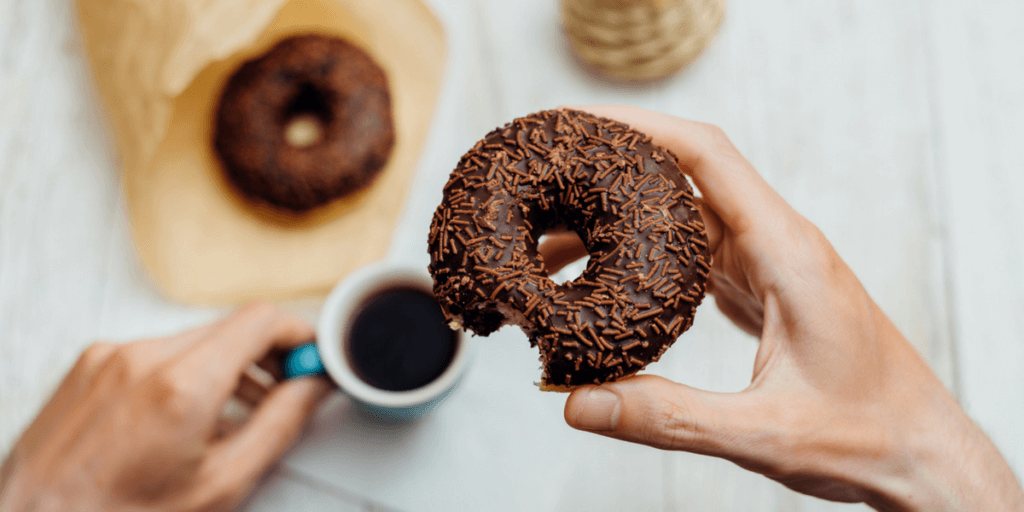If you are finding ways to stop sugar cravings, there are a few tactics that might be useful. Adopting healthier eating and drinking practices, being aware of added sugar on packaging, and substituting low-sugar meals for high-sugar ones may significantly impact your health.
It’s okay to sometimes indulge in a sweet treat. Furthermore, no food needs to be prohibited. However, consuming excessive amounts of sugar may raise your chance of developing several illnesses, including diabetes, heart disease, tooth decay, and weight gain.
Tips To Stop Sugar Cravings

1. Stay Hydrated
Dehydration has been found to contribute to food cravings, particularly those for sugary foods. This is because our bodies can sometimes misinterpret the signals of dehydration as hunger, leading us to crave quick energy sources, such as sugar.
According to research, staying properly hydrated can reduce the likelihood of these cravings, making it one of the easier ways to stop sugar cravings. Drinking water throughout the day can help maintain hydration levels and prevent confusion between thirst and hunger. Before reaching for a sugary snack, try drinking a glass of water and see if it alleviates the craving.
You may be surprised at how often dehydration is the real culprit. In addition to water, consider drinking unsweetened beverages like cold brew coffee or unsweetened tea. These drinks can keep you hydrated while offering a refreshing alternative to sugary options, helping curb your desire for sweet snacks without compromising your health.
2. Never Skip Meals
Blood sugar swings, often triggered by skipping meals, can also lead to intense sugar cravings. When you go without food for extended periods, your body experiences a dip in blood sugar levels, which triggers a survival mechanism. In response, your body signals you to consume more, especially sugary foods, to quickly raise your blood sugar back to normal levels.
To maintain stable blood sugar levels and prevent these cravings, it’s important to eat meals and snacks at regular intervals. This helps regulate your blood sugar and prevents the sudden crashes that can trigger your desire for sugar. Along with appropriate meal timing, it’s crucial to include a balance of micronutrients and macronutrients in your diet.
Micronutrients like potassium, calcium, and iron are essential for various bodily functions, while macronutrients, including fats, proteins, and carbohydrates, provide the energy your body needs in larger amounts. A well-rounded, healthy diet can help you feel fuller for longer, manage your blood sugar levels, and even reduce cravings for sweets.
3. Eat Fruits
In addition to being rich in fibre, vitamins, minerals, and antioxidants, the natural sugar found in fruit can answer how to stop sugar cravings more healthily. Unlike processed or sugary foods, the fibre in fruit helps the body metabolize sugar more slowly, preventing the rapid spikes and crashes in blood sugar that can trigger more cravings.
The fibre also promotes feelings of fullness, making it easier to resist the urge for sweet, unhealthy snacks. Experts recommend limiting added sugar to no more than 10% of your daily caloric intake to maintain a balanced diet and overall health.
Diets focused on whole foods, such as plant-based or Mediterranean diets, can naturally curb sugar cravings by offering nutrient-dense options that provide lasting energy without the temptation of processed sugars. Incorporating whole grains, fresh fruits, vegetables, and other nutritious foods into your meals, rather than relying on sugary or processed snacks, will help regulate your appetite and keep you feeling satisfied longer.
4. Plan Out Your Snacks
Planning ahead and organizing your snacks and meals can significantly help in resisting sugar cravings. By establishing a routine and preparing nutrient-dense options in advance, you can avoid the temptation of reaching for sugary treats when hunger strikes.
When snacks are well-planned, they’re not only more likely to be healthier, but they can also be portable, making it easier to maintain balanced eating habits throughout the day. This is especially beneficial when you’re on the go or have a busy schedule. Moreover, this kind of meal prep and organization is particularly helpful during stressful or hectic times.
When you’re dealing with high-pressure situations, your body may naturally crave quick sources of energy, often in the form of sugar. However, having pre-prepared, healthy snacks on hand can reduce the likelihood of succumbing to those cravings, allowing you to stay on track with your health goals. By anticipating these moments and planning accordingly, you can maintain better control over your eating habits.
5. Get Enough Sleep
When you don’t get enough sleep, your body often craves sugar as a quick source of energy. Sleep deprivation can disrupt the balance of hunger-regulating hormones, such as ghrelin and leptin, making you more likely to reach for high-sugar foods. Your body is essentially looking for fast fixes to compensate for the lack of rest.
Moreover, studies have shown that diets rich in added sugars and saturated fats, and low in fibre, are often linked to poor sleep quality. The combination of inadequate sleep and an unhealthy diet can create a vicious cycle that makes it harder to maintain healthy eating habits.
As one of the ways to stop sugar cravings, immediately turning to sugary snacks when you’re feeling fatigued, consider taking a brief power nap if possible. A short nap can help recharge your energy levels and improve alertness without the need for a sugar fix. This approach can help break the pattern of using food as a solution to sleep deprivation, promoting healthier habits and more restful nights in the long run.
6. Chew Some Gum
If you’re looking for how to stop sugar cravings, try chewing a stick of gum. Studies have shown that chewing gum can help reduce food cravings, including those for sugary snacks. The act of chewing itself can help distract your mind from the craving, providing a simple and effective way to manage hunger and avoid giving in to sugary temptations.
Additionally, gum can help curb the desire for sweets by keeping your mouth busy and your mind focused on something other than food. Some research suggests that the minty or fruity flavors of gum may also help satisfy your sweet tooth without actually consuming sugar.
Chewing gum can also be a great alternative when you’re craving something sweet but don’t want to overeat. It can provide a temporary, low-calorie distraction that may help you regain control over your impulses and stay on track with healthier eating habits. It’s a small but practical tool for resisting sugar cravings.
7. Manage Stress
Managing your stress levels effectively can help reduce sugar cravings. When you’re stressed, your body releases cortisol, a hormone that plays a role in the “fight or flight” response. Cortisol also stimulates the production of glucose, or sugar, to provide quick energy during stressful situations.
However, chronic stress can lead to elevated cortisol levels, which may cause your body to crave sugary foods as a way to quickly restore energy and comfort. This can result in emotional eating, where individuals turn to food, especially sugar, to cope with their stress or emotions. Research has shown that consuming sugar during stressful times can trigger a brain response that reinforces the craving for more sweets.
In other words, the brain becomes conditioned to associate sugar with stress relief, creating a cycle of emotional eating. By managing stress through practices such as mindfulness, meditation, exercise, or deep breathing, you can help break this cycle, reducing the urge to seek comfort in sugary foods.
8. Exercise
Exercise is widely recognized for its benefits to overall health, but it also plays a significant role in managing sugar cravings. Research suggests that engaging in physical activity can increase the production of endorphins, which are often referred to as “feel-good” chemicals. These endorphins are neurotransmitters that promote feelings of happiness and well-being, creating a natural mood boost.
As a result, the release of endorphins from exercise can mimic the pleasurable sensation that some people experience from consuming sugary foods, potentially reducing the desire for sweets. When endorphin levels rise after exercise, they help improve your mood and energy levels, which may make you less likely to crave sugary snacks as a source of comfort or quick energy.
Moreover, regular exercise can help regulate blood sugar levels, further diminishing the urge to seek out sugar. By incorporating physical activity into your routine, you not only improve your overall health but also reduce the likelihood of succumbing to sugar cravings.
9. Use Healthy Diversion
Adopting healthy routines can be an effective way to manage sugar cravings and help you develop new coping mechanisms. Often, the motivation behind sugar cravings is not true hunger but rather a response to emotions like stress, boredom, or habit. When you’re bored or feeling restless, reaching for a sugary snack can seem like a quick solution, but this can easily become a cycle.
Instead, try to redirect your focus by engaging in activities that are both enjoyable and fulfilling. For example, going for a walk can be a refreshing way to clear your mind and reduce the urge to snack. Similarly, calling a friend or engaging in a hobby you enjoy can help distract you from the craving and provide a sense of connection or accomplishment.
By learning to identify and manage the underlying emotional triggers for cravings, you can create healthier routines that divert your attention from sugary foods and improve your overall well-being.
When To See A Dietitian For Advice
Sugar cravings are a common experience for many people and, in most cases, do not indicate a serious underlying medical issue. They are often temporary and can be triggered by various factors such as stress, lack of sleep, hormonal fluctuations, or simply a habit.
However, if these cravings become frequent and intense or start to interfere with your ability to maintain a balanced diet or lifestyle, it may be worth seeking professional guidance. Consulting a qualified dietitian or healthcare provider can provide personalized advice and ways to stop sugar cravings to identify any underlying causes, such as nutrient deficiencies or imbalances in your diet.
If you begin to feel overwhelmed or guilty about your cravings, or if they are affecting your mental health, it may also be beneficial to discuss these feelings with a healthcare professional. Sometimes, emotional or psychological factors play a significant role in food cravings, and strategies such as therapy or mental health support may be necessary to help address these deeper issues.
Furthermore, if you are considering a sugar detox or making drastic dietary changes, it is especially important to consult with a healthcare professional beforehand, particularly if you have specific health conditions like diabetes, are on blood sugar medications, or have a history of disordered eating.
Undertaking such changes without proper guidance could lead to unwanted side effects or complications. A healthcare professional can help ensure that any changes to your diet are safe and tailored to your individual health needs.
FAQ
Q: Why am I unable to quit consuming sugar?
A: Your brain’s demand for a reward is what fuels sugar cravings. Because of this, maintaining a nutritious diet may sometimes be challenging. In moderation, sugar consumption is OK. However, avoiding overeating as much as possible might be beneficial if you find yourself doing it.
Q: How can a sugar detox begin?
A: Steer clear of processed meals if you want to detox from sugar. They are completely unhealthy. Rather, choose entire meals like vegetables, whole grains, whole fruits, whole legumes, and bone-in meat. They don’t include any artificial substances or additions.
Q: What is the duration of a sugar craving?
A: The average duration of a sugar craving is fifteen minutes. Because of the addictive nature of the sweet white granules, an excessive attempt to reduce additional sugar may backfire.












I have not checked in here for a while because I thought it was getting boring, but the last several posts are good quality so I guess I’ll add you back to my everyday bloglist. You deserve it my friend 🙂
Thank you so much for coming back and for your kind words! I’m really glad you enjoyed the recent posts. Your support means a lot, and I truly appreciate you adding the site back to your bloglist! 😊